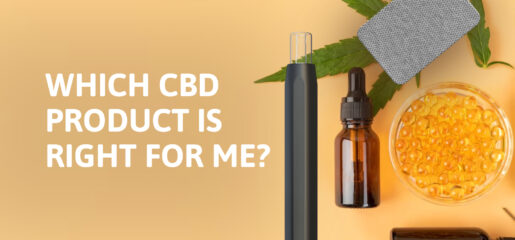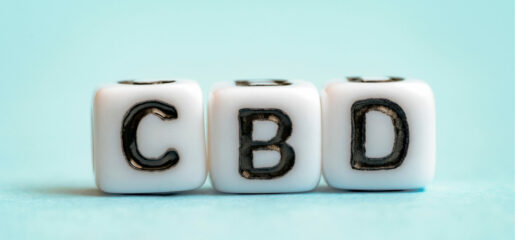
As the legal use of hemp and other cannabis products spreads, consumers are becoming more aware of their choices. Two natural chemicals found in plants of the Cannabis genus are cannabidiol (CBD) and tetrahydrocannabinol (THC). While both are cannabinoids, the two have very different effects on your body.
CBD vs THC: What’s the Difference?
There are three types of Cannabis plants that are most commonly used medicinally or recreationally: Cannabis sativa, Cannabis indica, and Cannabis ruderalis. Each plant has different concentrations of CBD and THC; in fact, cannabis grown for recreational use in the U.S. is typically very low in CBD and high in THC, whereas hemp used industrially is just the opposite.
CBD has been identified as a medicinal product with zero psychoactive compounds, while THC, on the other hand, is a psychoactive chemical known to induce euphoria. Both substances have been found to have very different effects on the human body given their differing compositions, which is why the debate of CBD vs. THC rages on.
CBD VS THC: Their Chemical Structures
CBD is antipsychotic, neuroprotective, and can reduce seizures. It counteracts the psychoactive effects of THC by blocking the pathway that allows for tetrahydrocannabinol to induce its psychomimetic effects in the brain. CBD oil has been used to treat chronic pain, inflammation, anxiety disorders, muscle spasms, seizures, insomnia, depression, lack of appetite, among other things.
Ideally, CBD and THC have the same molecular structure; the only difference is that CBD has a hydroxyl group attached to its chain. THC’s hydroxyl group is replaced with a carboxylic acid ring which causes it to produce psychoactive effects that are more intense than those of CBD.
CBD and THC are similar to your body’s endocannabinoids, a type of neurotransmitter. These chemicals help regulate homeostasis in nearly every mammal. In humans, endocannabinoids affect appetite, mood, memory and pain. They’re also involved in regulating sleep, growth and development, immune function, stress management and much more.
CBD VS THC Psychoactive Properties
THC is one of the most well-known cannabinoids because it has psychoactive properties. While, CBD is not a psychoactive substance.
These two chemicals depend on several factors, but one of the most important distinctions is that THC directly engages with the endocannabinoid system’s CB1 receptors. Because it engages with the endocannabinoid system, THC has several effects on the body. The main chemical component in marijuana is delta-8 THC, which binds to cannabinoid receptors in the brain. It causes a sensation of euphoria. CBD poorly binds CB1 receptors. CBD does not bind at all to CB1 receptors.
CBD VS THC Legality
CBD oil is legal in some states, whereas THC products are not federally legal. To be legally sold in all 50 states, CBD products must contain less than 0.3% THC by volume, according to the 2014 Farm Bill. This bill also legalized hemp growing under certain circumstances in the U.S., which can be a source of CBD.
Different states have different laws about the legality of cannabis products with higher levels of THC. For example, in Massachusetts, any product that contains more than 0.3% trace amount of THC is considered marijuana and is therefore illegal to sell and possess. There are legal limits on how much THC can be contained in cannabis products in other states such as Colorado, Washington, and California.
CBD VS THC Medical Benefits
Although CBD and THC have been studied extensively, little research highlights their medical benefits. However, cannabis with higher levels of THC is effective in treating things like chronic pain, nausea, loss of appetite, and insomnia.
Thc can help relieve symptoms like pain, inflammation (like arthritis ), stress, depression, anxiety, addiction, and epilepsy. Many doctors prescribe thc to help with nausea after chemotherapy because it can reduce vomiting. It’s often used to increase appetite in people who’ve lost weight or are severely ill.
CBD is associated with several medical benefits, including treating seizures, inflammation, pain, anxiety disorders, addiction, and nausea. It has also been used to reduce the side effects of chemotherapy manage psychotic disorders, and it can even help treat severe mental conditions like schizophrenia.
The Food and Drug Administration ( FDA) approved Epidiolex, a CBD medication, in 2018 to treat seizures associated with two rare and severe forms of epilepsy.
CBD VS THC Side Effects
The side effects of THC are often associated with feelings of euphoria, anxiety, and trouble concentrating. CBD is not known to have these adverse side effects. CBD is known to cause side effects such as dry mouth, low blood pressure, lightheadedness, drowsiness, and fatigue.
Cannabis has been used medicinally for thousands of years. As modern research uncovers the benefits of cannabis, more people than ever before are turning to natural remedies like hemp and cannabis oils. As the legalization of cannabis spreads, more and more people will find relief from their ailments through its unique properties.
CBD VS THC Drug Testing
Both THC and CBD are fat-soluble. This means they are stored in the body’s fatty tissue, not water-soluble like other molecules. Over time, the body will continue to hold onto these cannabinoids regardless of whether or not a person is actively using cannabis products. Frequent use may make it difficult for people looking to pass drug tests.
It is important to note that not all drug tests have the capabilities to detect CBD. Drug testing laboratories must determine the concentration of THC metabolites in a person’s system. This is not possible for CBD due to its low concentration and non-psychoactive nature.
However, most drug tests will be able to detect traces of THC either in blood or urine. Frequent cannabis users may have high levels of THC in their system for a couple of weeks or more. This could result in a positive drug test even if the person has stopped using.
Conclusion
Both THC and CBD are valuable parts of the cannabis plant. They each hold medicinal benefits that can be helpful to people suffering from different medical conditions, but it is essential to understand the differences between the two compounds. The critical difference between THC and CBD is how each interacts with our bodies’ cannabinoid receptors. While THC directly engages these receptors, CBD does not. Some people prefer CBD oil to THC oil – they get all the benefits, with fewer side effects.

